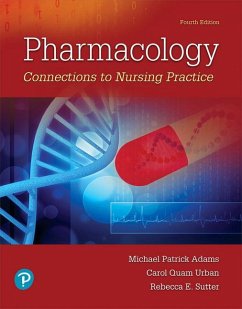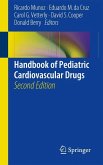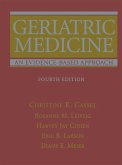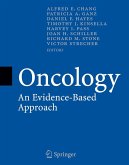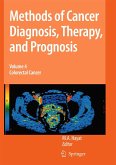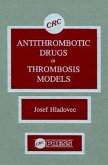- Gebundenes Buch
- Merkliste
- Auf die Merkliste
- Bewerten Bewerten
- Teilen
- Produkt teilen
- Produkterinnerung
- Produkterinnerung
For courses in pharmacology.
A patient-centered approach to pharmacology in nursing practice Pharmacology: Connections to Nursing Practice links pharmacology to nursing practice and patient care. Features illuminate connections between pharmacology and nursing practice, from patient scenarios and practice applications, to lifespan considerations, alternative therapies, and gender and cultural influences. The use of prototype drugs helps nurses learn a vast range of medications, while organization by body systems and diseases places drugs in the context of their therapeutic applications. The…mehr
Andere Kunden interessierten sich auch für
![Handbook of Pediatric Cardiovascular Drugs Handbook of Pediatric Cardiovascular Drugs]() Handbook of Pediatric Cardiovascular Drugs121,99 €
Handbook of Pediatric Cardiovascular Drugs121,99 €![Geriatric Medicine Geriatric Medicine]() Christine K. Cassel / Rosanne Leipzig / Harvey Jay Cohen / Eric B. Larson / Diane E. Meier (eds.)Geriatric Medicine414,99 €
Christine K. Cassel / Rosanne Leipzig / Harvey Jay Cohen / Eric B. Larson / Diane E. Meier (eds.)Geriatric Medicine414,99 €![Understanding Pharmacology for Health Professionals Understanding Pharmacology for Health Professionals]() Susan TurleyUnderstanding Pharmacology for Health Professionals162,99 €
Susan TurleyUnderstanding Pharmacology for Health Professionals162,99 €![Oncology Oncology]() Alfred E. Chang / Patricia A. Ganz / Daniel F. Hayes / Timothy Kinsella / Harvey I. Pass / Joan H. Schiller / Richard M. Stone / Victor Strecher (eds.)Oncology240,99 €
Alfred E. Chang / Patricia A. Ganz / Daniel F. Hayes / Timothy Kinsella / Harvey I. Pass / Joan H. Schiller / Richard M. Stone / Victor Strecher (eds.)Oncology240,99 €![Methods of Cancer Diagnosis, Therapy, and Prognosis, Volume 4 Methods of Cancer Diagnosis, Therapy, and Prognosis, Volume 4]() M.A. Hayat (ed.)Methods of Cancer Diagnosis, Therapy, and Prognosis, Volume 4232,99 €
M.A. Hayat (ed.)Methods of Cancer Diagnosis, Therapy, and Prognosis, Volume 4232,99 €![Antithrombotic Drugs in Thrombosis Models Antithrombotic Drugs in Thrombosis Models]() Josef HladovecAntithrombotic Drugs in Thrombosis Models438,99 €
Josef HladovecAntithrombotic Drugs in Thrombosis Models438,99 €![Nursing care and ECMO Nursing care and ECMO]() Nursing Care and ECMONursing care and ECMO27,99 €
Nursing Care and ECMONursing care and ECMO27,99 €-
-
-
For courses in pharmacology.
A patient-centered approach to pharmacology in nursing practice
Pharmacology: Connections to Nursing Practice links pharmacology to nursing practice and patient care. Features illuminate connections between pharmacology and nursing practice, from patient scenarios and practice applications, to lifespan considerations, alternative therapies, and gender and cultural influences. The use of prototype drugs helps nurses learn a vast range of medications, while organization by body systems and diseases places drugs in the context of their therapeutic applications. The 4th edition includes more than 30 new FDA-approved drugs, more than 20 new visuals clarifying concepts, and a new feature developing the clinical decision-making skills of advanced practice nurses.
Hinweis: Dieser Artikel kann nur an eine deutsche Lieferadresse ausgeliefert werden.
A patient-centered approach to pharmacology in nursing practice
Pharmacology: Connections to Nursing Practice links pharmacology to nursing practice and patient care. Features illuminate connections between pharmacology and nursing practice, from patient scenarios and practice applications, to lifespan considerations, alternative therapies, and gender and cultural influences. The use of prototype drugs helps nurses learn a vast range of medications, while organization by body systems and diseases places drugs in the context of their therapeutic applications. The 4th edition includes more than 30 new FDA-approved drugs, more than 20 new visuals clarifying concepts, and a new feature developing the clinical decision-making skills of advanced practice nurses.
Hinweis: Dieser Artikel kann nur an eine deutsche Lieferadresse ausgeliefert werden.
Produktdetails
- Produktdetails
- Verlag: Pearson
- 4. Aufl.
- Seitenzahl: 1560
- Erscheinungstermin: 6. Februar 2018
- Englisch
- Abmessung: 279mm x 224mm x 56mm
- Gewicht: 2990g
- ISBN-13: 9780134867366
- ISBN-10: 013486736X
- Artikelnr.: 52961490
- Herstellerkennzeichnung
- Libri GmbH
- Europaallee 1
- 36244 Bad Hersfeld
- gpsr@libri.de
- Verlag: Pearson
- 4. Aufl.
- Seitenzahl: 1560
- Erscheinungstermin: 6. Februar 2018
- Englisch
- Abmessung: 279mm x 224mm x 56mm
- Gewicht: 2990g
- ISBN-13: 9780134867366
- ISBN-10: 013486736X
- Artikelnr.: 52961490
- Herstellerkennzeichnung
- Libri GmbH
- Europaallee 1
- 36244 Bad Hersfeld
- gpsr@libri.de
About our authors Michael Patrick Adams, PhD, is an accomplished educator, author and national speaker. The National Institute for Staff and Organizational Development in Austin, Texas, named Dr. Adams a Master Teacher. He has published two other textbooks with Pearson Education: Core Concepts in Pharmacology and Pharmacology for Nursing: A Pathophysiologic Approach. Dr. Adams obtained his master’s degree in pharmacology from Michigan State University and his doctorate in education from the University of South Florida. Dr. Adams was on the faculty of Lansing Community College and St. Petersburg College and was Dean of Health Professions at Pasco-Hernando State College for over 19 years. He is currently Adjunct Professor of Anatomy and Physiology at Hillsborough Community College. Carol Quam Urban, PhD, RN, Associate Professor, is Director of the School of Nursing and an Associate Dean in the College of Health and Human Services at George Mason University in Fairfax, Virginia. She has been on the faculty in the School of Nursing for over two decades and has worked with Dr. Rebecca Sutter to open three nurse-managed health clinics, academic-community partnerships that care for uninsured patients and provide educational opportunities for Mason nursing students. She has published the Pearson textbook Pharmacology for Nurses: A Pathophysiologic Approach with Dr. Adams and Dr. Holland. Rebecca E. Sutter, DNP, BC-FNP, is Assistant Professor in the School of Nursing and one of the directors of an academic nurse-managed clinic within the College of Health and Human Services at George Mason University in Fairfax, Virginia. She has been in the nursing faculty for over 15 years at community colleges and universities, as well as practicing for over 20 years as a pediatric ICU nurse and a board-certified family nurse practitioner.
PART 1: FUNDAMENTAL PRINCIPLES OF PHARMACOLOGY
1. Introduction to Pharmacology: Concepts and Connections
2. Drug Regulations
3. Pharmacokinetics
4. Pharmacodynamics
5. Adverse Drug Effects and Drug Interactions
6. Medication Errors and Risk Reduction
7. The Role of Complementary and Alternative Therapies in
Pharmacotherapy
PART 2: PHARMACOLOGY AND THE NURSE-PATIENT RELATIONSHIP
1. Pharmacotherapy During Pregnancy and Lactation
2. Pharmacotherapy of the Pediatric Patient
3. Pharmacotherapy of the Geriatric Patient
4. Individual Variations in Drug Responses
PART 3: PHARMACOLOGY OF THE AUTONOMIC NERVOUS SYSTEM
1. Review of Neurotransmitters and the Autonomic Nervous System
2. Cholinergic Agonists
3. Cholinergic Antagonists
4. Adrenergic Agonists
5. Adrenergic Antagonists
PART 4: PHARMACOLOGY OF THE CENTRAL NERVOUS SYSTEM
1. Review of the Central Nervous System
2. Pharmacotherapy of Anxiety and Sleep Disorders
3. Pharmacotherapy of Mood Disorders
4. Pharmacotherapy of Psychoses
5. Pharmacotherapy of Degenerative Diseases of the Central Nervous
System
6. Pharmacotherapy of Seizures
7. Pharmacotherapy of Muscle Spasms and Spasticity
8. Central Nervous System Stimulants and Drugs for Attention
Deficit/Hyperactivity Disorder
9. Pharmacotherapy of Severe Pain and Migraines
10. Anesthetics and Anesthesia Adjuncts
11. Pharmacology of Substance Abuse
PART 5: PHARMACOLOGY OF THE CARDIOVASCULAR SYSTEM
1. Review of the Cardiovascular System
2. Pharmacotherapy of Hyperlipidemia
3. Pharmacotherapy with Calcium Channel Blockers
4. Drugs Affecting the Renin-Angiotensin-Aldosterone System
5. Diuretic Therapy and the Pharmacotherapy of Renal Failure
6. Pharmacotherapy of Fluid Imbalance, Electrolyte, and Acid--Base
Disorders
7. Pharmacotherapy of Hypertension
8. Pharmacotherapy of Angina Pectoris and Myocardial Infarction
9. Pharmacotherapy of Heart Failure
10. Pharmacotherapy of Dysrhythmias
11. Pharmacotherapy of Coagulation Disorders
12. Pharmacotherapy of Hematopoietic Disorders
PART 6: PHARMACOLOGY OF BODY DEFENSES
1. Review of Body Defenses and the Immune System
2. Pharmacotherapy of Inflammation and Fever
3. Immunostimulants and Immunosuppressants
4. Immunizing Agents
PART 7: PHARMACOLOGY OF THE RESPIRATORY SYSTEM AND ALLERGY
1. Pharmacotherapy of Asthma and Other Pulmonary Disorders
2. Pharmacotherapy of Allergic Rhinitis and the Common Cold
PART 8: PHARMACOLOGY OF ANTI-INFECTIVE PHARMACOTHERAPY
1. Basic Principles of Anti-Infective Pharmacotherapy
2. Antibiotics Affecting the Bacterial Cell Wall
3. Antibiotics Affecting Bacterial Protein Synthesis
4. Fluoroquinolones and Miscellaneous Antibacterials
5. Sulfonamides and the Pharmacotherapy of Urinary Tract Infections
6. Pharmacotherapy of Mycobacterial Infections
7. Pharmacotherapy of Fungal Infections
8. Pharmacotherapy of Protozoan and Helminthic Infections
9. Pharmacotherapy of Non-HIV Viral Infections
10. Pharmacotherapy of HIV-AIDS
11. Basic Principles of Antineoplastic Therapy
12. Pharmacotherapy of Neoplasia
PART 9: PHARMACOLOGY OF THE GASTROINTESTINAL SYSTEM
1. Review of the Gastrointestinal System
2. Pharmacotherapy of Peptic Ulcer Disease
3. Pharmacotherapy of Bowel Disorders and Other Gastrointestinal
Conditions
4. Vitamins and Minerals
5. Enteral and Parenteral Nutrition
6. Weight Reduction Strategies and the Pharmacotherapy of Obesity
PART 10: PHARMACOLOGY OF THE ENDOCRINE SYSTEM
1. Review of the Endocrine System
2. Hypothalamic and Pituitary Drugs
3. Pharmacotherapy of Diabetes Mellitus
4. Pharmacotherapy of Thyroid Disorders
5. Corticosteroids and Drugs Affecting the Adrenal Cortex
6. Estrogens, Progestins, and Drugs Modifying Uterine Function
7. Drugs for Modifying Conception
8. Drugs for Disorders and Conditions of the Male Reproductive System
PART 11: ADDITIONAL DRUG CLASSES
1. Pharmacotherapy of Bone and Joint Disorders
2. Pharmacotherapy of Dermatologic Disorders
3. Pharmacotherapy of Eye and Ear Disorders
4. Emergency Preparedness: Bioterrorism and Management of Poisoning
1. Introduction to Pharmacology: Concepts and Connections
2. Drug Regulations
3. Pharmacokinetics
4. Pharmacodynamics
5. Adverse Drug Effects and Drug Interactions
6. Medication Errors and Risk Reduction
7. The Role of Complementary and Alternative Therapies in
Pharmacotherapy
PART 2: PHARMACOLOGY AND THE NURSE-PATIENT RELATIONSHIP
1. Pharmacotherapy During Pregnancy and Lactation
2. Pharmacotherapy of the Pediatric Patient
3. Pharmacotherapy of the Geriatric Patient
4. Individual Variations in Drug Responses
PART 3: PHARMACOLOGY OF THE AUTONOMIC NERVOUS SYSTEM
1. Review of Neurotransmitters and the Autonomic Nervous System
2. Cholinergic Agonists
3. Cholinergic Antagonists
4. Adrenergic Agonists
5. Adrenergic Antagonists
PART 4: PHARMACOLOGY OF THE CENTRAL NERVOUS SYSTEM
1. Review of the Central Nervous System
2. Pharmacotherapy of Anxiety and Sleep Disorders
3. Pharmacotherapy of Mood Disorders
4. Pharmacotherapy of Psychoses
5. Pharmacotherapy of Degenerative Diseases of the Central Nervous
System
6. Pharmacotherapy of Seizures
7. Pharmacotherapy of Muscle Spasms and Spasticity
8. Central Nervous System Stimulants and Drugs for Attention
Deficit/Hyperactivity Disorder
9. Pharmacotherapy of Severe Pain and Migraines
10. Anesthetics and Anesthesia Adjuncts
11. Pharmacology of Substance Abuse
PART 5: PHARMACOLOGY OF THE CARDIOVASCULAR SYSTEM
1. Review of the Cardiovascular System
2. Pharmacotherapy of Hyperlipidemia
3. Pharmacotherapy with Calcium Channel Blockers
4. Drugs Affecting the Renin-Angiotensin-Aldosterone System
5. Diuretic Therapy and the Pharmacotherapy of Renal Failure
6. Pharmacotherapy of Fluid Imbalance, Electrolyte, and Acid--Base
Disorders
7. Pharmacotherapy of Hypertension
8. Pharmacotherapy of Angina Pectoris and Myocardial Infarction
9. Pharmacotherapy of Heart Failure
10. Pharmacotherapy of Dysrhythmias
11. Pharmacotherapy of Coagulation Disorders
12. Pharmacotherapy of Hematopoietic Disorders
PART 6: PHARMACOLOGY OF BODY DEFENSES
1. Review of Body Defenses and the Immune System
2. Pharmacotherapy of Inflammation and Fever
3. Immunostimulants and Immunosuppressants
4. Immunizing Agents
PART 7: PHARMACOLOGY OF THE RESPIRATORY SYSTEM AND ALLERGY
1. Pharmacotherapy of Asthma and Other Pulmonary Disorders
2. Pharmacotherapy of Allergic Rhinitis and the Common Cold
PART 8: PHARMACOLOGY OF ANTI-INFECTIVE PHARMACOTHERAPY
1. Basic Principles of Anti-Infective Pharmacotherapy
2. Antibiotics Affecting the Bacterial Cell Wall
3. Antibiotics Affecting Bacterial Protein Synthesis
4. Fluoroquinolones and Miscellaneous Antibacterials
5. Sulfonamides and the Pharmacotherapy of Urinary Tract Infections
6. Pharmacotherapy of Mycobacterial Infections
7. Pharmacotherapy of Fungal Infections
8. Pharmacotherapy of Protozoan and Helminthic Infections
9. Pharmacotherapy of Non-HIV Viral Infections
10. Pharmacotherapy of HIV-AIDS
11. Basic Principles of Antineoplastic Therapy
12. Pharmacotherapy of Neoplasia
PART 9: PHARMACOLOGY OF THE GASTROINTESTINAL SYSTEM
1. Review of the Gastrointestinal System
2. Pharmacotherapy of Peptic Ulcer Disease
3. Pharmacotherapy of Bowel Disorders and Other Gastrointestinal
Conditions
4. Vitamins and Minerals
5. Enteral and Parenteral Nutrition
6. Weight Reduction Strategies and the Pharmacotherapy of Obesity
PART 10: PHARMACOLOGY OF THE ENDOCRINE SYSTEM
1. Review of the Endocrine System
2. Hypothalamic and Pituitary Drugs
3. Pharmacotherapy of Diabetes Mellitus
4. Pharmacotherapy of Thyroid Disorders
5. Corticosteroids and Drugs Affecting the Adrenal Cortex
6. Estrogens, Progestins, and Drugs Modifying Uterine Function
7. Drugs for Modifying Conception
8. Drugs for Disorders and Conditions of the Male Reproductive System
PART 11: ADDITIONAL DRUG CLASSES
1. Pharmacotherapy of Bone and Joint Disorders
2. Pharmacotherapy of Dermatologic Disorders
3. Pharmacotherapy of Eye and Ear Disorders
4. Emergency Preparedness: Bioterrorism and Management of Poisoning
PART 1: FUNDAMENTAL PRINCIPLES OF PHARMACOLOGY
1. Introduction to Pharmacology: Concepts and Connections
2. Drug Regulations
3. Pharmacokinetics
4. Pharmacodynamics
5. Adverse Drug Effects and Drug Interactions
6. Medication Errors and Risk Reduction
7. The Role of Complementary and Alternative Therapies in
Pharmacotherapy
PART 2: PHARMACOLOGY AND THE NURSE-PATIENT RELATIONSHIP
1. Pharmacotherapy During Pregnancy and Lactation
2. Pharmacotherapy of the Pediatric Patient
3. Pharmacotherapy of the Geriatric Patient
4. Individual Variations in Drug Responses
PART 3: PHARMACOLOGY OF THE AUTONOMIC NERVOUS SYSTEM
1. Review of Neurotransmitters and the Autonomic Nervous System
2. Cholinergic Agonists
3. Cholinergic Antagonists
4. Adrenergic Agonists
5. Adrenergic Antagonists
PART 4: PHARMACOLOGY OF THE CENTRAL NERVOUS SYSTEM
1. Review of the Central Nervous System
2. Pharmacotherapy of Anxiety and Sleep Disorders
3. Pharmacotherapy of Mood Disorders
4. Pharmacotherapy of Psychoses
5. Pharmacotherapy of Degenerative Diseases of the Central Nervous
System
6. Pharmacotherapy of Seizures
7. Pharmacotherapy of Muscle Spasms and Spasticity
8. Central Nervous System Stimulants and Drugs for Attention
Deficit/Hyperactivity Disorder
9. Pharmacotherapy of Severe Pain and Migraines
10. Anesthetics and Anesthesia Adjuncts
11. Pharmacology of Substance Abuse
PART 5: PHARMACOLOGY OF THE CARDIOVASCULAR SYSTEM
1. Review of the Cardiovascular System
2. Pharmacotherapy of Hyperlipidemia
3. Pharmacotherapy with Calcium Channel Blockers
4. Drugs Affecting the Renin-Angiotensin-Aldosterone System
5. Diuretic Therapy and the Pharmacotherapy of Renal Failure
6. Pharmacotherapy of Fluid Imbalance, Electrolyte, and Acid--Base
Disorders
7. Pharmacotherapy of Hypertension
8. Pharmacotherapy of Angina Pectoris and Myocardial Infarction
9. Pharmacotherapy of Heart Failure
10. Pharmacotherapy of Dysrhythmias
11. Pharmacotherapy of Coagulation Disorders
12. Pharmacotherapy of Hematopoietic Disorders
PART 6: PHARMACOLOGY OF BODY DEFENSES
1. Review of Body Defenses and the Immune System
2. Pharmacotherapy of Inflammation and Fever
3. Immunostimulants and Immunosuppressants
4. Immunizing Agents
PART 7: PHARMACOLOGY OF THE RESPIRATORY SYSTEM AND ALLERGY
1. Pharmacotherapy of Asthma and Other Pulmonary Disorders
2. Pharmacotherapy of Allergic Rhinitis and the Common Cold
PART 8: PHARMACOLOGY OF ANTI-INFECTIVE PHARMACOTHERAPY
1. Basic Principles of Anti-Infective Pharmacotherapy
2. Antibiotics Affecting the Bacterial Cell Wall
3. Antibiotics Affecting Bacterial Protein Synthesis
4. Fluoroquinolones and Miscellaneous Antibacterials
5. Sulfonamides and the Pharmacotherapy of Urinary Tract Infections
6. Pharmacotherapy of Mycobacterial Infections
7. Pharmacotherapy of Fungal Infections
8. Pharmacotherapy of Protozoan and Helminthic Infections
9. Pharmacotherapy of Non-HIV Viral Infections
10. Pharmacotherapy of HIV-AIDS
11. Basic Principles of Antineoplastic Therapy
12. Pharmacotherapy of Neoplasia
PART 9: PHARMACOLOGY OF THE GASTROINTESTINAL SYSTEM
1. Review of the Gastrointestinal System
2. Pharmacotherapy of Peptic Ulcer Disease
3. Pharmacotherapy of Bowel Disorders and Other Gastrointestinal
Conditions
4. Vitamins and Minerals
5. Enteral and Parenteral Nutrition
6. Weight Reduction Strategies and the Pharmacotherapy of Obesity
PART 10: PHARMACOLOGY OF THE ENDOCRINE SYSTEM
1. Review of the Endocrine System
2. Hypothalamic and Pituitary Drugs
3. Pharmacotherapy of Diabetes Mellitus
4. Pharmacotherapy of Thyroid Disorders
5. Corticosteroids and Drugs Affecting the Adrenal Cortex
6. Estrogens, Progestins, and Drugs Modifying Uterine Function
7. Drugs for Modifying Conception
8. Drugs for Disorders and Conditions of the Male Reproductive System
PART 11: ADDITIONAL DRUG CLASSES
1. Pharmacotherapy of Bone and Joint Disorders
2. Pharmacotherapy of Dermatologic Disorders
3. Pharmacotherapy of Eye and Ear Disorders
4. Emergency Preparedness: Bioterrorism and Management of Poisoning
1. Introduction to Pharmacology: Concepts and Connections
2. Drug Regulations
3. Pharmacokinetics
4. Pharmacodynamics
5. Adverse Drug Effects and Drug Interactions
6. Medication Errors and Risk Reduction
7. The Role of Complementary and Alternative Therapies in
Pharmacotherapy
PART 2: PHARMACOLOGY AND THE NURSE-PATIENT RELATIONSHIP
1. Pharmacotherapy During Pregnancy and Lactation
2. Pharmacotherapy of the Pediatric Patient
3. Pharmacotherapy of the Geriatric Patient
4. Individual Variations in Drug Responses
PART 3: PHARMACOLOGY OF THE AUTONOMIC NERVOUS SYSTEM
1. Review of Neurotransmitters and the Autonomic Nervous System
2. Cholinergic Agonists
3. Cholinergic Antagonists
4. Adrenergic Agonists
5. Adrenergic Antagonists
PART 4: PHARMACOLOGY OF THE CENTRAL NERVOUS SYSTEM
1. Review of the Central Nervous System
2. Pharmacotherapy of Anxiety and Sleep Disorders
3. Pharmacotherapy of Mood Disorders
4. Pharmacotherapy of Psychoses
5. Pharmacotherapy of Degenerative Diseases of the Central Nervous
System
6. Pharmacotherapy of Seizures
7. Pharmacotherapy of Muscle Spasms and Spasticity
8. Central Nervous System Stimulants and Drugs for Attention
Deficit/Hyperactivity Disorder
9. Pharmacotherapy of Severe Pain and Migraines
10. Anesthetics and Anesthesia Adjuncts
11. Pharmacology of Substance Abuse
PART 5: PHARMACOLOGY OF THE CARDIOVASCULAR SYSTEM
1. Review of the Cardiovascular System
2. Pharmacotherapy of Hyperlipidemia
3. Pharmacotherapy with Calcium Channel Blockers
4. Drugs Affecting the Renin-Angiotensin-Aldosterone System
5. Diuretic Therapy and the Pharmacotherapy of Renal Failure
6. Pharmacotherapy of Fluid Imbalance, Electrolyte, and Acid--Base
Disorders
7. Pharmacotherapy of Hypertension
8. Pharmacotherapy of Angina Pectoris and Myocardial Infarction
9. Pharmacotherapy of Heart Failure
10. Pharmacotherapy of Dysrhythmias
11. Pharmacotherapy of Coagulation Disorders
12. Pharmacotherapy of Hematopoietic Disorders
PART 6: PHARMACOLOGY OF BODY DEFENSES
1. Review of Body Defenses and the Immune System
2. Pharmacotherapy of Inflammation and Fever
3. Immunostimulants and Immunosuppressants
4. Immunizing Agents
PART 7: PHARMACOLOGY OF THE RESPIRATORY SYSTEM AND ALLERGY
1. Pharmacotherapy of Asthma and Other Pulmonary Disorders
2. Pharmacotherapy of Allergic Rhinitis and the Common Cold
PART 8: PHARMACOLOGY OF ANTI-INFECTIVE PHARMACOTHERAPY
1. Basic Principles of Anti-Infective Pharmacotherapy
2. Antibiotics Affecting the Bacterial Cell Wall
3. Antibiotics Affecting Bacterial Protein Synthesis
4. Fluoroquinolones and Miscellaneous Antibacterials
5. Sulfonamides and the Pharmacotherapy of Urinary Tract Infections
6. Pharmacotherapy of Mycobacterial Infections
7. Pharmacotherapy of Fungal Infections
8. Pharmacotherapy of Protozoan and Helminthic Infections
9. Pharmacotherapy of Non-HIV Viral Infections
10. Pharmacotherapy of HIV-AIDS
11. Basic Principles of Antineoplastic Therapy
12. Pharmacotherapy of Neoplasia
PART 9: PHARMACOLOGY OF THE GASTROINTESTINAL SYSTEM
1. Review of the Gastrointestinal System
2. Pharmacotherapy of Peptic Ulcer Disease
3. Pharmacotherapy of Bowel Disorders and Other Gastrointestinal
Conditions
4. Vitamins and Minerals
5. Enteral and Parenteral Nutrition
6. Weight Reduction Strategies and the Pharmacotherapy of Obesity
PART 10: PHARMACOLOGY OF THE ENDOCRINE SYSTEM
1. Review of the Endocrine System
2. Hypothalamic and Pituitary Drugs
3. Pharmacotherapy of Diabetes Mellitus
4. Pharmacotherapy of Thyroid Disorders
5. Corticosteroids and Drugs Affecting the Adrenal Cortex
6. Estrogens, Progestins, and Drugs Modifying Uterine Function
7. Drugs for Modifying Conception
8. Drugs for Disorders and Conditions of the Male Reproductive System
PART 11: ADDITIONAL DRUG CLASSES
1. Pharmacotherapy of Bone and Joint Disorders
2. Pharmacotherapy of Dermatologic Disorders
3. Pharmacotherapy of Eye and Ear Disorders
4. Emergency Preparedness: Bioterrorism and Management of Poisoning

